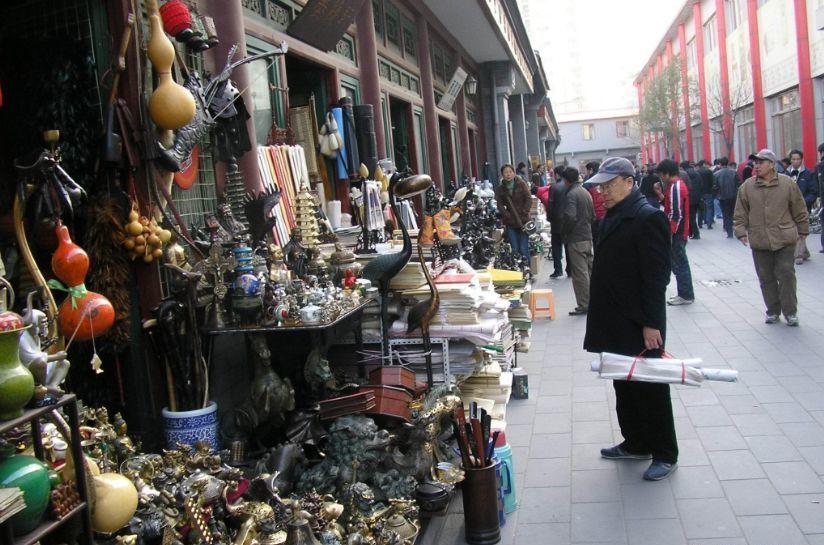First, the interpretation of antique appreciation
Treasure hunting the world
Antiques, in the old days, were called bone dong, referring to the meaning of miscellaneous. "Bone" here refers to the essence of the past, and "Dong" means to understand, and bone Dong is to understand the essence left behind by the ancients. Later, some people wrote bone Dong as antiques. The word "Bone Dong" was first seen in the book "Doubtful Yao" written by Zhang Xuan during the Kaiyuan period of the Tang Dynasty: "The word "Bone Dong" is a dialect, and there is no definite character at the beginning."

Dong Qichang of the Ming Dynasty's "Thirteen Sayings of Antiques" said: "Miscellaneous ancient artifacts are not of the same kind, and the name bone Dong". During the Qianlong period of the Qing Dynasty, bone Dong was called "antique", that is, the abbreviation of ancient literary play. After liberation, in view of the saying in the Book of Books: "Playing with people loses morality, and playthings lose their aspirations", some people proposed to change antiques into cultural relics, and the term cultural relics is still common to this day. However, as Mr. Qi Gong wrote, playthings may not be lost, and the charm of playing with old relics contained in the word antiques cannot be replaced by other words, so we still call "ancient play" as an antique.
There are many kinds of antiques, mainly including calligraphy and painting, inscriptions, brushes, ancient ink, famous paper, ancient stones, seals, bamboo carvings, wood carvings, tooth horns, lacquerware, silk embroidery, gold and silverware, coins, ancient idols, ancient bricks, ancient books, jewelry, Buddha statues, jade, pottery, porcelain, bronze, bronze mirrors, cloisonné furniture, snuff bottles, purple sand ware and so on. The "appraisal" in antique appreciation is identification, screening, analysis, research and judgment. "Appreciation" is appreciation, which is to combine the knowledge, feelings, associations, etc. obtained through identification with personal experience, and to make comprehensive judgments and evaluations.
Second, through the appreciation of antiques to inherit Chinese civilization
Through antique appreciation, you can inherit Chinese civilization, and its meaning is mainly reflected in the following aspects.
(1) Appreciation of antiques to improve cultural heritage
In the history of world civilization, Chinese culture is the only ancient and modern cultural landscape that has lasted for more than 5,000 years without interruption. The civilizations of ancient Egypt, ancient India and ancient Babylon, which are called the "four ancient civilizations" together with Chinese culture, have been interrupted, and the ancient Greek civilization and ancient Roman civilization that have arisen since then have also been interrupted; in the history of modern civilization, British, French and German civilizations have no longer been brilliant, and American civilization since the 20th century has been the most powerful cultural form, but it is an immigrant culture.
Through the appreciation of antiques, we can deepen our understanding of Chinese history and Chinese culture, make us absorb the essence of Traditional Chinese culture, make us feel the breadth and profundity of Chinese culture, and make us more confident in Chinese culture.
(2) Appreciation of antiques to improve artistic literacy
Antiques are like ancient playthings, in fact, they are not playthings, antiques are the cultural heritage of the Chinese nation, and the cultural and artistic soul treasure of the Chinese nation. Through the appreciation of antiques, we have cultivated the eyes that can read works of art and become people with certain artistic qualities. Many artists, such as Zhang Daqian, Xu Beihong, Qi Gong, Fan Zeng, etc., love antiques and draw cultural and artistic essence from them, and perhaps it is precisely this reason that has enabled their artistic realm to reach its peak and become brilliant. Facts have shown that antique appreciation is an important way to improve people's artistic literacy.
(3) Borrowing antiques to appreciate and create a spiritual civilization
For a long period of history, the appreciation of antiques was only the patent of a few people, and the broad masses of the people must devote all their energies to the labor production of material materials. Only today, when the material civilization of society is highly developed, can the construction of spiritual civilization reflect the necessity and feasibility.
Only then will there be a wave of antiques boom higher than a wave. Of course, matter is primary and spirit is secondary. However, without the corresponding cultural and artistic spirit and material progress with the times, we may become slaves to the material wealth we have created.
(4) Learn from antiques to build a harmonious society
In the real society, some people often treat others and the environment as conquerors, thus creating contradictions and conflicts between people and others, people and society, and people and the environment. The development of modern science and technology and the expansion of instrumental rationality have further exacerbated this division and expansion of human beings - the competition between people based on interests has become more confrontational and indifferent, and people rely on expansion and consumerism, resulting in people endlessly taking from nature, environmental pollution, and the greenhouse effect are becoming more and more serious.